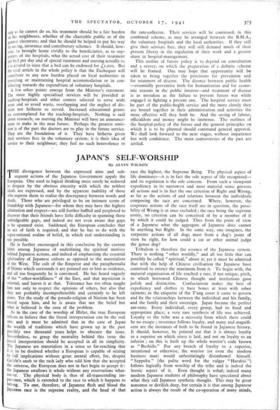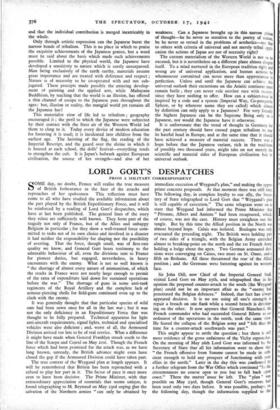JAPAN'S SELF-WORSHIP
By ALVIN WILSON
T HE divergence between the expressed aims and sub- sequent actions of the Japanese Government appals the European. One used to logical thinking must surely be reduced to despair by the obvious sincerity with which the noblest ideals are expressed, and by the apparent inability of those who express them to realise the discrepancy between words and deeds. Those who are privileged to be on intimate terms of friendship with Japanese—for whom they may have the highest admiration and respect—are still further baffled and perplexed to discover that their friends have little difficulty in spanning these unbridgeable gaps, and indeed are not even aware that gaps to be spanned exist. Saddened, the European concludes that an act of faith is required, and that he has to do with the supra-rational realms of belief, in which real understanding is not possible. sequent actions of the Japanese Government appals the European. One used to logical thinking must surely be reduced to despair by the obvious sincerity with which the noblest ideals are expressed, and by the apparent inability of those who express them to realise the discrepancy between words and deeds. Those who are privileged to be on intimate terms of friendship with Japanese—for whom they may have the highest admiration and respect—are still further baffled and perplexed to discover that their friends have little difficulty in spanning these unbridgeable gaps, and indeed are not even aware that gaps to be spanned exist. Saddened, the European concludes that an act of faith is required, and that he has to do with the supra-rational realms of belief, in which real understanding is not possible.
He is further encouraged in this conclusion by the current habit among Japanese of underlining the spiritual motives behind Japanese actions, and indeed of emphasising the essential spirituality of Japanese culture as opposed to the materialism of the West. The cult of the Emperor and the paraphernalia of Shinto which surrounds it are pointed out to him as evidence, and all too frequently he is convinced. He has heard vaguely of the " other-worldliness " of the East, and that mysticism is oriental, and leaves it at that. Tolerance has too often taught him not only io respect the opinions of others, but also that they are probably incomprehensible and certainly to be left alone. Yet the study of the pseudo-religion of Nazism has been forced upon him, and he is aware that not the belief but what is believed is the crux of the problem. • As in the case of the worship of Hitler, the true European refuses to believe that the literal interpretation can be the real one, and it must be admitted that in the case of Japan the wealth of traditions which have grown up in the past possibly two thousand years helps to obscure the issue. Nevertheless, to grasp the mentality behind this issue the literal interpretation should be accepted in all its simplicity. The Japanese are materialists in a sense so far-reaching that it is to be doubted whether a European is capable of seizing its full implications without great mental effort, for, despite Carlyle's snub to the rash lady who told him that she accepted the universe, the European does not in fact begin to ,ccept it: the Japanese swallows it whole without any reservations what- soever. The physical body is thus of all-transcending im- portance, which is extended to the race to which it happens to belong. To one, therefore, of Japanese flesh and blood the Japanese race is the supreme reality, and the head of that race the highest, the Supreme Being. The physical aspect of life dominates—it is in fact the sole aspect of life recognised— and its regulation is the sole concern. From such a viewpoint expediency in its narrowest and most material sense governs all actions and is in fact the one criterion of Right and Wrong, as far as the actions of and relations between the individuals composing the race are concerned. Where, however, the corporate actions of the race itself are in question, the possi- bility of Wrong is at once excluded ; the race being the supreme entity, no criterion can be conceived of by a member of it by which it could be judged. Thus from the point of view of a Japanese what the aggregate of Japanese does cannot be anything but Right. In the same way, one imagines, the corporate actions of all dogs must from a dog's point of view be right, for how could a cat or other animal judge the genus dog?
Tribalism is therefore the essence of the Japanese system. There is nothing " other worldly," and all too little that can possibly be called " spiritual," about it; yet it must be admitted that with the help of Chinese civilisation the Japanese have contrived to extract the maximum from it. To begin with, the material organisation of life reached a rare, if not unique, pitch, to which borrowed Chinese thought and institutions gave polish and distinction. Confucianism makes the best of expediency and clothes Its bare bones at least with sober raiment; as the etiquette of the T'ang court it came to govern and fix the relationships between the individual and his family, and the family and their sovereign. Japan became the perfect ant-state. Every individual, every group, had its• fixed and appropriate place; a very rare synthesis of life was achieved. Loyalty to the tribe was a necessity from which there could be no escape ; reverence follows loyalty, and many and magnifi- cent are the instances of both to be found in Japanese history. It should, however, be pointed out that it is always loyalty to a superior on which stress is laid, and not on loyalty to an inferior ; on this is built up the whole warrior's code known as " Bushido." For any breach of loyalty to a superior, intentional or otherwise, the warrior (or even the modern business man) would unhesitatingly disembowel himself. " Seppuku " (the polite word for the vulgar " Harakiri ") follows logically from worship of the tribe and is indeed the heroic- aspect of it. Even thought is tribal; indeed many modern Japanese students of philosophy have speculated about what they call Japanese synthetic thought. This may be great nonsense or devilish deep, but certain it is that among Japanese action is always the result of the co-operation of many minds, and that the individual contribution is merged inextricably in the whole.
Only through artistic expression can the Japanese burst the narrow bonds of tribalism. This is no place in which to praise the exquisite achievements of the Japanese genius, but a word must be said about the basis which made such achievements possible. Limited to the physical world, the Japanese have developed a sensitivity to nature which is surely unsurpassed. Man being exclusively of the earth earthy, materials assume great importance and are treated with deference and respect ; Nature is of necessity to be co-operated with and not sub- jugated. These precepts made possible the amazing develop- ment of painting and the applied arts, while Mahayana Buddhism, by teaching that the world is an illusion, has offered a thin channel of escape to the Japanese poet throughout the ages: but, illusion or reality, the matejial world yet remains all the Japanese has!
This materialist view of life led to tribalism ; geography encouraged it ; the peril to which the Japanese were subjected by their contact with the freer air of the Western World led them to cling to it. Today every device of modern education for fostering it is used; it is inculcated into children from the earliest age. The hoisting of the flag, the reading of the Imperial Rescript, and the guard over the shrine in which it is housed at each school, the dolls' festival—everything tends to strengthen the cult. It is Japan's bulwark against European civilisation, the source of her strength—and also of her weakness. Can a Japanese brought up in this narrow prison of thought—be he never so sensitive to the poetry of nature, be he never so versed in the problems of aesthetics—see dui to others with criteria of universal and not merely tribal apph. cation the actions of Japan are not of necessity right?
The current materialism of the Western World is not to be excused, but it is nevertheless on a different plane almost despite itself. To a mind nurtured in the European tradition right and wrong are of universal application, and human actions hy whomsoever committed can never more than approximate to perfection. Unless and until the Japanese can achieve this universal outlook their excursions on the Asiatic continent must remain futile ; they can never rule another race with success, since they have nothing to offer. How can a subject-race be inspired by a code and a system (Imperial Way, Co-prosperity Sphere, or by whatever name they are called) which almost by definition can only apply to a Japanese? For very literally the highest Japanese can be the Supreme Being only to a Japanese, nor would the Japanese have it otherwise.
It is unfortunate that the trend of thought in Germany for the past century should have caused pagan tribalism to rear its hateful head in Europe, and at the same time that it should have achieved a measure of material success. There was a hope before that the Japanese variant, rich in the traditions of possibly two thousand years, might take on not merely the scientific and material sides of European civilisation but its universal outlook.



























 Previous page
Previous page